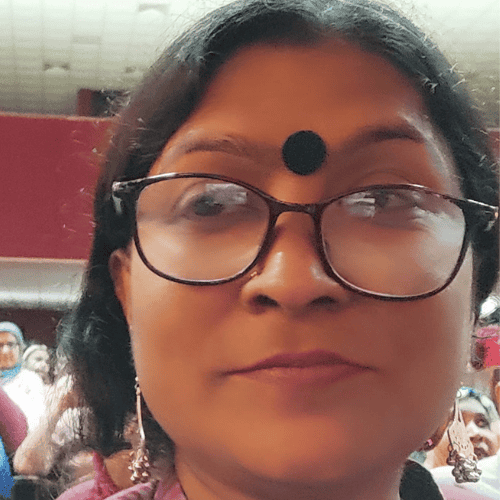
DTP alumna Marina Sultana Kalpona is an experienced migrant workers’ rights advocate in Bangladesh. She is a Program Director at Bangladesh’s prestigious Refugee and Migratory Movements Research Unit (RMMRU) affiliated with Dhaka University.
Marina and her team at RMMRU research, educate, campaign and advocate for safer migration practices in Bangladesh and in destination countries. Labor migration is a key issue for Bangladesh. Bangladesh is the sixth largest source of labour migrants globally. The remittances of migrant workers made 5.26 percent contribution to Bangladesh’s GDP in 2023. However, many Bangladeshi migrant workers face exploitation at every stage of the migration process – from high and illegal recruitment fees, extortionate interest rates on loans in Bangladesh to discrimination, scams, job-substitution, physical and sexual violence, low-pay, trafficking, forced labour and unpaid wages and detention in countries of destination.
The exploitation and abuses are often hidden and receive little attention, policy priority or accountability. Marina’s work therefore makes a significant impact on peoples’ lives.
Marina said DTP’s training was very helpful because the training taught her how to connect theory, policy and practice. DTP’s focus on migrant workers has been guided by its partnership with Migrant Forum in Asia (MFA).
“The DTP/MFA training provided an in-depth knowledge and a broader understanding of human rights-based approaches. It strengthened my ability to connect public policies with ground realities in Bangladesh. The insights from DTP have empowered me to challenge government policies effectively and to advocate for transparent policy practices. In a nutshell, DTP has been instrumental in preparing me to foster informed debates and drive policy reforms.”
Marina says that advocating for policy changes in the migration sector in Bangladesh is “characterized by bureaucratic inertia and resistance”. However, she said that “DTP instilled a profound sense of motivation and inspiration to work for human rights” in her. Therefore, she does not give up her advocacy effort despite the bureaucratic resistance.
“DTP training emphasized that policies should ultimately work for the people, and this guiding principle has been central to my advocacy efforts.”
RMMRU’s research has highlighted that the abuses and vulnerability of migrant workers begins at home in Bangladesh, before departure – and then on return. Marina is particularly passionate about women migrant workers’ rights. Her passion has led RMMRU to introduce pre-departure training, financial literacy programs, and skill enhancement for women migrant workers. Recognising the significance of reintegration for returning migrants, Marina also spearheaded programs aimed at their social and economic reintegration.
Marina’s inspiration to work in this sector is rooted in her personal commitment to social justice. Growing up during politically turbulent times in Bangladesh, she was actively engaged in various social justice movements from her university years, which shaped her commitment to advocating for the rights of marginalised communities.
Looking ahead, Marina aims to document the lived experiences and struggles of migrant workers and other marginalised groups, providing a nuanced narrative that highlights both their challenges and resilience. Additionally, she remains passionate about grassroots engagement, particularly with ethnic minorities, aiming to amplify their voices and issues. Marina is interested to connect with other DTP alumni in Bangladesh and in the region to explore how they can collaborate more together.
DTP acknowledges the traditional custodians of the land on which we work, the Bedegal people of the Eora Nation. We recognise their lands were never ceded, and we acknowledge their struggles for recognition and rights and pay our respects to the Elders – past, present – and the youth who are working towards a brighter tomorrow. This continent always was and always will be Aboriginal land.
Aboriginal and Torres Strait Islander peoples should be aware that this website contains images or names of people who have passed away.
DTP acknowledges the traditional custodians of the land on which we work, the Bedegal people of the Eora Nation. We recognise their lands were never ceded, and we acknowledge their struggles for recognition and rights and pay our respects to the Elders – past, present – and the youth who are working towards a brighter tomorrow. This continent always was and always will be Aboriginal land.
Aboriginal and Torres Strait Islander peoples should be aware that this website contains images or names of people who have passed away.
Privacy Policy | Terms of Use | Disclaimer | Policies
© 2022 Diplomacy Training Program | ABN 31 003 925 148 | Web Design by Studio Clvr